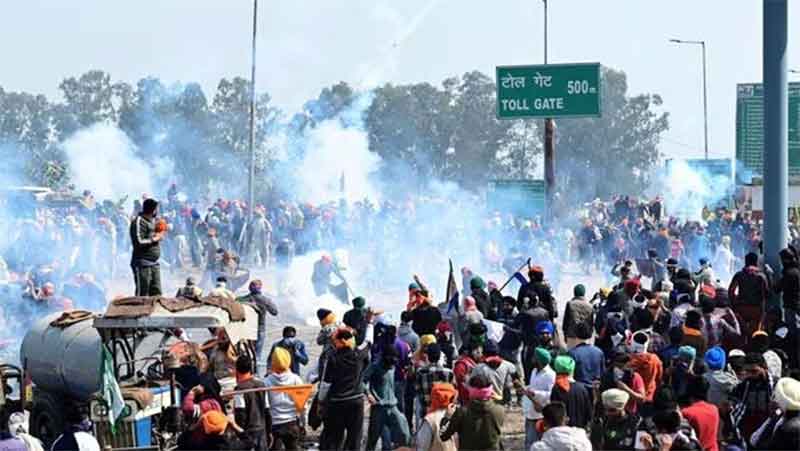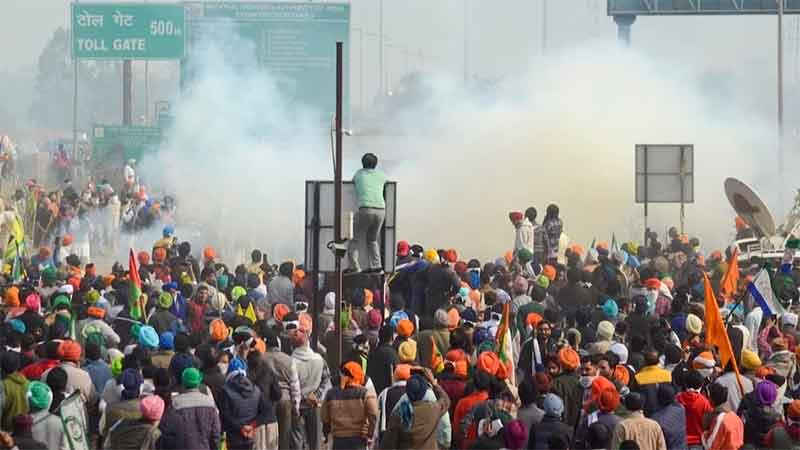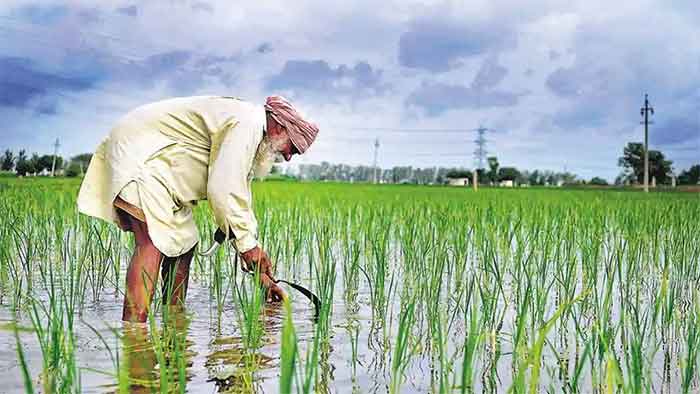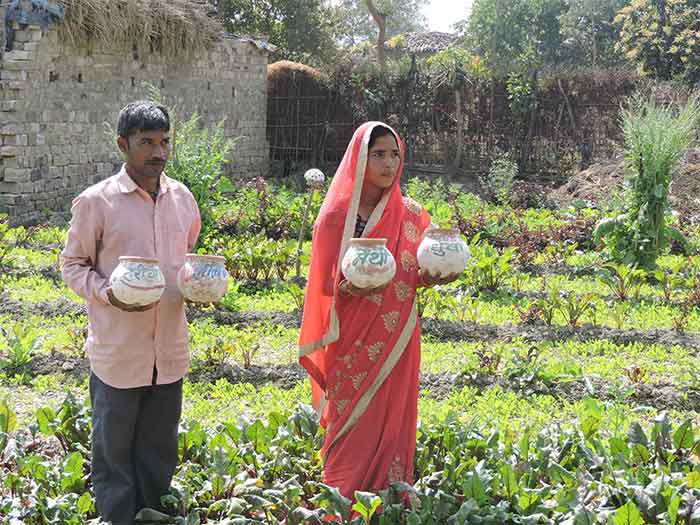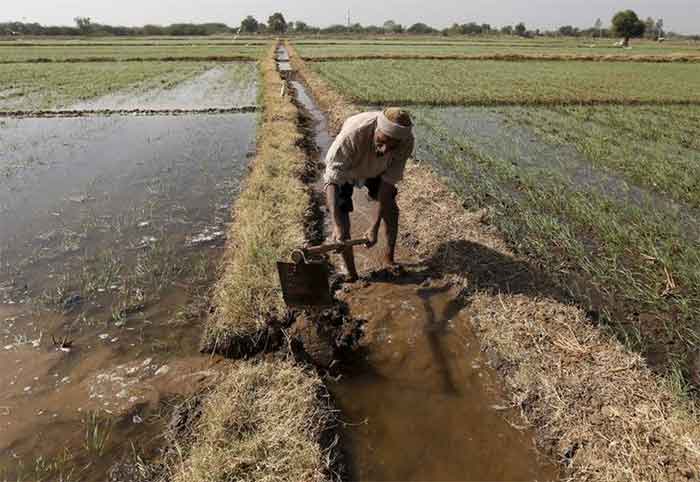
The Prime Minister of the country Narendra Modi has given the slogan ‘Small farmers, the glory of the nation’. His slogan is quite accurate, as evidenced by a report by the United Nations. The report highlights the fact that family farming is the only way to ensure food security for the whole world and save the environment from pollution. The capitalist/ corporate farming system, the family farming system, the state farming system, the cooperative farming system, and the community farming system are prominent among the agriculture farming systems that are prevalent in different countries of the world. Under the family farming system, small farmers own the agricultural land. Their land holdings are small in size and they carry out various agricultural activities through the labour of family members. Under this system, farmers mainly cultivate for their livelihood and they have small quantity of agricultural commodities to sell in the market.
In India, in 2012-13, the number of marginal farmers (less than 2.5 acres) was 68 per cent and small farmers (less than 2.5 acres to 5 acres) was 18 per cent. In 2018-19, the number of marginal farmers increased to 71 per cent and the number of small farmers decreased to 17 per cent. Thus the percentage of marginal and small farmers which was 86 in 2012-13 has increased to 88 per cent during 2018-19. These government figures have brought to light the fact that the land holdings of semi-medium, medium and small farmers are declining, which has resulted in an increase in the percentage of marginal farmers. In this regard, it is a fact that due to the economic and agricultural policies adopted in the country, making agriculture a loss-making business, although the percentage of marginal farmers has increased, a large number of marginal farmers have become agricultural and other labourers.
The definitions of marginal and small farmers show that their land holdings are very small. Along with the economic and agricultural policies of the government, the very small size of land holdings is creating many problems for these farmers. Due to the high cost of the ‘New Agricultural Technology’ (NAT) package, marginal and small farmers are either unable to adopt the NAT or face many difficulties in the way of adopting it. Out of the package of this technology-high yielding seeds, equipments required for assured irrigation, chemical fertilizers,insecticides, pesticides, fungicides, herbicides, and machinery are usually provided by the capitalist / corporate entities. They charge exorbitant prices and deprive farmers of the traditional inputs they use.
As a result of the very small size of the land holdings, these farmers have very little quantity of commodities to sell in the market and they engage themselves in agriculture mainly for subsistence. The cost of agricultural inputs is being drastically increased as a result of the government handing over the pricing of many inputs commonly used in agricultural production to the unregulated market. At the same time, the use of machinery and herbicides in the package of ‘NAT’ has drastically reduced employment in the agricultural sector, with the biggest hit falling on marginal and small farmers among the various farming categories. These aspects have brought to light the fact that the income level of these farmers is very low.
It is natural that the very low income level of these farmers for various reasons would have a detrimental effect on various aspects of their lives. The level of consumption expenditure of these farmers is so low that a large portion of their expenditure is spent on non-perishable items (mainly grains and some other items) to satisfy their hunger. Various surveys have revealed the fact that their pockets are empty and their stomachs are hungry and they do not even have enough clothes to cover their bodies.
Very low income levels of marginal and small farmers and to maintain a minimum level of consumption just to survive, these farmers have to take loans which turn into debt due to non-repayment on time. Different research studies have brought to light the fact that as we scale down from the big farmer category to the marginal farmer category, the debt burden goes on increasing. This fact is explained by the debt burden per acre of land owned by different categories of farmers. Marginal and small farmers have to borrow relatively more from non-institutional sources to buy commodities of consumption and agricultural inputs as compared to large, medium and semi-medium farmers which charge much higher interest rates than institutional sources. At the same time, non-institutional sources exploit these farmers in many other ways.What to talk about repayment of loans, these farmers are not even in a position to pay the interest on their loans as they have to borrow even for burning stove to have two meals a day. In this way their debt goes on increasing and they are encircled in a debt trap.
Poverty is a situation that causes a lot of problems. Although the various definitions of the poverty line in India are by no means satisfactory, various research studies conducted in the country have revealed the fact that almost all marginal and small farmers are born in debt, live their hard life in debt and poverty, and leave behind a mountain of debt and extreme poverty for their future generations. They either die a death of deprivation or when all hopes for their lives are dashed by governments and society, they are also committing suicide. A census survey conducted by Punjabi University, Patiala; Guru Nanak Dev University; Amritsar and Punjab Agricultural University, Ludhiana on suicides of farmers and agricultural labourers for the Punjab Government has revealed that more than three-quarters of the suicides committed by farmers in Punjab alone belong to marginal and small farmers.
Everyone in the world needs a home to cover their head. This need is greater for the working class than for other sections of the society because every day the labourers have to work hard to earn a living. A large number of the country’s marginal and small farmers are forced to live in mud, semi-concrete houses. A small number of these farmers have concrete houses. All these types of houses lack the basic amenities needed in homes. Apart from the lack of adequate rooms for all the members of the family, there is a lack of kitchens and bathrooms in these houses. The basic amenities that a house should have in order to rise above the poverty line are also severely lacking.
Education plays an important role in understanding the various problems of life. Some members of the country’s marginal and small farming families are either illiterate or have only completed schooling. The standard of schooling of the family members of these farmers is very poor. Most of the state governments have turned their backs towards government schools, which has resulted in private schools flourishing in rural areas as well. Private school fees and other expenses are so high that most marginal and small farmers cannot afford to send their family members to these schools. In addition, most private schools aim to double their profits during the day and quadruple at night, instead of providing good quality education to their students. Colleges, universities, and other institutions can play an important role in providing higher education. Governments are also withdrawing their hand in this regard. As a result, there is a severe shortage of teachers and other basic facilities in many government colleges, universities, and other government-aided educational institutions. Today, most of the teachers recruited in some of these institutions are being given very low salaries and inadequate other facilities. News of teachers not getting their salaries on time continues to make headlines. Under such circumstances, research and development activities for the betterment of society are lagging far behind. The main purpose of private institutions providing higher education is to increase their profits very fast and they charge very high fees and other expenses from the students. Marginal and small farmers are unable to even dream of sending their family members to these institutions.
Healthcare services are very helpful in making workers efficient. There is a dire need for good quality timely healthcare services to increase the efficiency of the workers. The COVID-19 pandemic has made it clear that only public institutions can provide good quality and timely healthcare services. In this regard too, the governments are deliberately ignoring a large number of public institutions like educational institutions. Very low income levels of marginal and small farmers, their rising and mounting mountain-like debt, their rapidly spreading abject poverty, and the severe lack of public institutions provide these working classes with the low quality healthcare services they need in a timely manner. As a result, these farmers continue to be subjected to all sorts of exploitation during their illnesses and under compulsion they take healthcare from quacks. Due to their poverty, marginal and small farmers are exploited by thread-healers and the like, and many of these people die during severe illnesses.
The way governments are ignoring marginal and small farmers can cause food security and environmental problems for the country, as well as many other economic, socio-cultural, political and other problems. The main issue here is to think about where the marginal and small farmers would get employment if they are displaced. The main objective of the corporate farming is to increase their profits and not to produce for the country. Instead, they will produce for the market. Therefore, it is imperative that concerted efforts be made to improve the lives of the country’s marginal and small farmers. These initiatives have to be taken primarily by governments, society, and farmers at their own level.
Many of the problems facing marginal and small farmers are rooted in low their income levels. It is, therefore, the duty of the Central and State governments to ensure a minimum level of income for these farmers in which they would be able to meet the basic human needs – food, clothing, housing, education, health care, clean environment, and social security. The Central government has been fixing the MSP of 23 commodities. Although these farmers have very small quantities of agricultural commodities to sell in the market, the Central government should ensure that the prices are remunerative for the farmers. At the same time procurement of commodities at these remunerative prices has to be ensured so that these farmers are protected from market exploitation. Due to the low level of commodities sold by these farmers in the market, the Central government has to give first and foremost priority to these farmers in providing subsidies / concessions / grants to various sections of the agricultural sector. The Central government should provide these farmers different inputs at concessional rates. In this regard, it is incumbent on the State governments to fix the MSP of the commodities which are not fixed by the Central government and to procure these commodities or to compensate marginal and small farmers for the difference between MSP and market prices. The State governments should ensure that the first priority is given to these farmers when giving subsidies / concessions / grants to the agricultural sector.
The increasing use of machinery and herbicides in the package of NAT has greatly reduced employment of these farmers in the agricultural sector. To overcome this problem the governments should not only ensure 100 days employment to the rural poor people including marginal and small farmers under MGNREGS but also increase the working days as per the needs of these sections to get employment and the wages paid under MGNREGS should be at be equal to the minimum wages fixed by governments. Apart from this, there is an urgent need to formulate and implement other employment schemes like MGNREGS.
Marginal and small farmers borrow to maintain a minimum level of consumption and production needs which turns into debt due to non-timely repayment and a major cause of suicides by these farmers. Therefore, it is incumbent upon the governments, especially the Central government, to provide interest free loans to these farmers from institutional sources as per their requirements.
Research and development activities play an important role in reducing the cost of agricultural production. It is the responsibility of the Central and State governments to ensure that research and development activities related to agriculture are carried out in public institutions.
Governments need to streamline the public distribution system (PDS) to maintain a fair minimum level of consumption for marginal and small farmers. The number and quantity of goods to be distributed under the PDS should be increased as per the needs of these farmers.
Marginal and small farmers are unable to build houses to meet the needs of their families. Governments should improve the ongoing housing schemes for the poor and ensure that their benefits are also passed on to these farmers.
Education helps human beings to understand and solve the problems they face. Healthcare services enhance human efficiency and performance. It has now been proven that the private sector institutions are making huge profits by providing these services and they are excluding the working class from availing the benefits of these services. Governments should ensure that these two services are provided by public institutions to all sections, including the marginal and small farmers.
Irrigation facilities and land reforms are important contributors to increasing agricultural productivity and production. At present, irrigation facilities and land reforms are mainly under the jurisdiction of the state governments. To provide guaranteed irrigation facilities to the marginal and small farmers, the state governments have to adapt the irrigation schemes to the agro-climatic conditions of the states and ensure that these facilities are given priority to these farmers.
The remarkable results of land reforms in various countries of the world, including India, have proved that these well-done reforms have improved the lives of farmers, especially marginal and small farmers, agricultural labourers, and rural artisans. By revising the ceiling on land holdings as per the requirements of the time, it will be necessary to ensure that the surplus land declared and acquired is distributed into these categories. The size of marginal and small farmers’ land holdings is not only small, but their very small land holdings are scattered in very small pieces in different places. To overcome this problem, the state governments have to ensure that the consolidation process is resumed and the injustices done to these farmers are eradicated. Land rents have skyrocketed in recent times. Marginal and small farmers lease in land on rent and increase the size of cultivated land so that they can make a living. There is an urgent need for the state governments to fix the land rent on a proper basis and implement it.
Social values play an important role in making human life better or worse. The richest sections of Indian society are obsessed with increasing their profits and rapidly seizing the country’s wealth. The upper middle class is playing two roles. A section of this class makes commendable contributions in improving the lives of the working classes of the society by making many sacrifices while always striving to uphold and promote healthy social values. The other part of this class seems to be working tirelessly to improve their lives in the capitalist system. Most of these people live on their own and maintain the illusion that they will soon climb the ladder of the ultimate rich and enjoy the comforts of that class. These sections criticise subsidies / concessions / grants given to the hard working marginal and small farmers and other poor working classes saying that the burden of taxes falls on them, but the benefits are being given to the poor. In such thinking and propaganda, they forget that even a student of economics knows that the major burden of taxes falls on the poor people. The COVID-19 pandemic has made it clear that humans can survive without cars, bungalows, airplanes, phones, and other luxury items, but they need food and other agricultural products to survive. World history and a report by the United Nations has made it clear that the family farming system is the best way to ensure food security for all mankind and to protect the environment from pollution. The family farming system is only possible with marginal and small farmers. The high income sections of the society are in dire need of changing their anti-working class people’s thinking.
Marginal and small farmers will have to make efforts to improve their lives along with governments and society. The ongoing farmers struggle in India is sending a very healthy message to improve the lives of farmers and other workers. Just as the farmers are contributing to the success of the farmers’ struggle , the farmers will have to work together in various aspects of agriculture. As the Zamin Prapti Sangharsh Committee in Punjab has shown the success of cooperative farming in Balad Kalan village of Sangrur district and some other villages of other districts and its success in Chak Kanian Kalan Society village of Moga district, Lambra Kangri village of Hoshiarpur district and landless women of Kerala, learning from this, marginal and small farmers have to adopt cooperative farming which will reduce their production costs, and increase their production and income level. In addition, there is a need to set up cooperatives to sell their products on the roadside, in villages, towns and cities. Doing so will not only increase their working days, but will also benefit them through value- addition and consumers will get fresh and other products at reasonable prices. The main basis for the success of the farmer struggle in India is its peaceful and democratic conduct. Marginal and small farmers will have to form pressure groups to improve education, healthcare, and other services. This would become by forming their own organizations, in collaboration with other organizations. The slogan given by the Prime Minister of the country ‘Small Farmers, the Glory of the Nation’ will only make sense if the governments, the society and the farmers themselves work together.
Dr. Gian Singh is Former Professor, Department of Economics, Punjabi University, Patiala.

